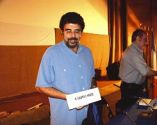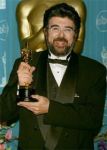|
Versión en español
 Gabriel Yared is one-of-a-kind composer. His vision of what a composer should or should not do gives his work a very personal touch; one very hard to find nowadays. The thorough campaign developed after Troy's release to make justice for his rejected work was not overseen by BSOSpirit, and we contacted him in hoping he would talk to us, giving first hand information about everything that surrounded his firing. More than interview we have decided to title this a chat, a very informal one, in which we had the opportunity to talk to a very unique man. Gabriel Yared is one-of-a-kind composer. His vision of what a composer should or should not do gives his work a very personal touch; one very hard to find nowadays. The thorough campaign developed after Troy's release to make justice for his rejected work was not overseen by BSOSpirit, and we contacted him in hoping he would talk to us, giving first hand information about everything that surrounded his firing. More than interview we have decided to title this a chat, a very informal one, in which we had the opportunity to talk to a very unique man.
By the way, on the occasion of our third anniversary in the net, he did not pass the opportunity to congratulate us. Here are a few brief words:
I would like to wish you a wonderful Third Anniversary and to give your readers all my best regards and wishes.
Gabriel.
Seville, June the 30th. 4P.M. Local time
A distant bell rings...
Gabriel Yared (GY): Hi, who's this?
BSOSpirit (BS): Hi Gabriel, this is Sergio.
GY: Oh, hi Sergio...how are you?
BS: Fine, things are fine... I presume you know we are going to talk about the Troy affair...
GY: (laughs) a very delicate way of putting it...very delicate indeed...yeah I know...and I must tell you Sergio that I was devastated when I first knew that I was fired and I have done something that nobody has ever done before in my situation...I have spoken out...
BS: a very brave act from your part...
GY:  Thanks... of course it's not the first time this has happened to me, I was fired from "Les Miserables", and from "Wings of the Dove"... and I have never spoken out because this time was not similar to what happened to me the other two times; this time was completely different... on "Les Miserables" for example I understood since first day of recording in the studio that Billie August (the director) didn't understand anything about music nor anything about what I was trying to do musically with his film... so when I was fired it was no surprise for me, because there was no harmony between the two of us. On "Wings of the Dove" it was hard at the beginning, because I had to replace another composer, and it was the first and only time this had happened to me. Edward Shearmur was on the film, but after my Oscar for "The English Patient", Harvey Weinstein from Miramax wanted me to score "Wings of the Dove"... although I told him that Ed's score was wonderful and I didn't understand what he wanted from me... he said 'more tunes, more melodies'... so finally I accepted the job and felt very bad about it and the whole situation of replacing another composer... and I promised myself never to do it again, ever... And so I did all my score, and in the end I was so happy and relieved to know that the director had come back to his first decision and used Ed's music. And as I have told you I promised never ever to do that again... Thanks... of course it's not the first time this has happened to me, I was fired from "Les Miserables", and from "Wings of the Dove"... and I have never spoken out because this time was not similar to what happened to me the other two times; this time was completely different... on "Les Miserables" for example I understood since first day of recording in the studio that Billie August (the director) didn't understand anything about music nor anything about what I was trying to do musically with his film... so when I was fired it was no surprise for me, because there was no harmony between the two of us. On "Wings of the Dove" it was hard at the beginning, because I had to replace another composer, and it was the first and only time this had happened to me. Edward Shearmur was on the film, but after my Oscar for "The English Patient", Harvey Weinstein from Miramax wanted me to score "Wings of the Dove"... although I told him that Ed's score was wonderful and I didn't understand what he wanted from me... he said 'more tunes, more melodies'... so finally I accepted the job and felt very bad about it and the whole situation of replacing another composer... and I promised myself never to do it again, ever... And so I did all my score, and in the end I was so happy and relieved to know that the director had come back to his first decision and used Ed's music. And as I have told you I promised never ever to do that again...
BS: Well, that kind of honesty is very difficult to find in our time...
GY: I don't know... that is a very nasty habit in film industry nowadays... it's not a big deal to be fired, not a big deal at all. But in the case of Troy it was a big deal... because I had been living with the director during almost a year... during all the pre-recording process, in which we searched Macedonian and Bulgarian folk music... and I sent him every demo for every cue I did... he was changing all the time his picture and I will change my music to conform the picture during a process that lasted six months, in which I worked every day. So when I knew I was fired after all the enthusiasm he had shown... but at this time I was totally unaware of the record track of rejecting composers that Wolfgang Petersen had: he had worked on Air Force One with Randy Newman and...
BS: ...replaced him for Jerry Goldsmith...
GY: Yeah, and he had worked with Angelo Badalamenti and replaced him with Silvestri on Shattered. Anyway, I didn't know that he had this record, the only thing I knew is that he was very sincere when he repeatedly told me: "I love your music, and all the different themes you have done... and so"... so being fired it's not a big deal, but in these conditions and in these specific situation... it was terrible. I think firing a composer in this way is a very bad habit for a lot of different reasons: It's bad for the composer who has been rejected. Because if the composer is, you know, as I am, it ends hurting the composer in his essence... affecting his faith in his own music, in his faith in the relationship between him and the director; it's bad too for the composer who is taking over the job, because the composer who comes on board at the last minute has to discover a whole film, he has to get involved in the story, the characters, the psychology and the action... all of it at the last minute. And also that fact gives him a very little amount of time to search, to dig, to explore, to find, and specially to go beyond his habits. Because one of the most important things for a composer is to go beyond your habits in composing, and if you have a month or less to compose 80 or 90 minutes of music, the result can only be bad for the quality of film music and music in general... and worst of all it generates a bad feeling in the confraternity among colleagues, because if a colleague is capable to come on board in a month and say "I'll replace that guy" he's giving very little of his true self of his best skills and creativity... I believe music is a grace coming from above and doing this to another of your kind, ridicules your ethics... I'm not talking about morality, but your ethics, the way you do things... and as long as there're composers who will come on board to replace a decent work from another composer, there'll always be producers who will replace composers.
So it's bad for the composer rejected, it's bad for the composer coming on board, and it's bad for the director, because he has e very little amount of time to get used to a new composer, new themes and new ideas for his film... and worst of all he has no other opportunity to reject or refuse whatever the composer comes with. He has to live with it...
It's also bad for the producers and the studio because they have to re-inject a lot of money on the film due to the great cost of re-composing and the immense cost of re-recording.
And finally it's bad for the relationship between the director and the composer, because that kind of attitude does not anchorage the permanence in a team, whereas permanence it's a very important issue in this industry that encourages creativity... you know, the examples like Rota-Fellini, or Leone-Morricone, or...
BS: ...Herrmann-Hitchcock, Williams-Spielberg...
GY: Yeah, exactly, or Anthony (Minghella) and myself... those are examples of great levels in music quality and in human relations... and all of it goes to garbage for what? To please a focus group of 20 people after a screen test? I must tell you, it's not worth of it...
BS: Not at all...
GY: So in result the fact of being fired from Troy was bad for me, bad for the one who replaced me, because he had so little time to come with music... and I have to tell you that I have not heard to his composition, nor I have seen the film... anyway I believe that all film composers must be composers first, and all of us are capable of compose anything we want without having a picture to give us inspiration...
BS: Yeah, it's curious that you say that, because that's exactly what classical music does!
GY: I know Sergio! When you're listening to a beautiful symphony by Mahler, you can close your eyes and make your own picture.
BS: Yeah, exactly!
GY: That same process can be done in film music without having the complete film in front of you to look at. As a composer my way of working implies that I have to be involved in the picture from the very beginning. When the picture has not been already shot and all are ideas and sketches. There is where I find myself more comfortable, because it's there and no other time when I have the opportunity to search and explore for whatever material I will come...
BS: I have to tell you, that is very rare...
GY: I know. My first film was done in 1980 with Jean Luc Goddard, and from that film I made the decision of not coming on a film once it's completed. That way it doesn't speak to me, when it really speaks to me is when it does not exist. My imagination works better when the thing I'm working on is foggy and not completely incarnated into pictures yet
But it makes my work very difficult. What I'm happy to know is many composers today are coming to the same conclusion as me: that is important to get involved since the beginning... if not, what we'll produce is our own habits... who can say that, for a film which production has lasted three years, he can write a good score that does ignore all that process and give in three months anything, a true creation, a work that sounds different than everything he has composed in the past?... the answer is simple... NO ONE could tell you that honestly.
BS: Yeah, a nd you almost can tell that this or that movie had been composed in a short time, given its' inaccuracy to the picture... nd you almost can tell that this or that movie had been composed in a short time, given its' inaccuracy to the picture...
GY: Sergio, we are composers. We are NOT FILM COMPOSERS. We are in our roots music composers, and when you are an artist you know that you don't own anything, it's given from above and all you can do is give form to what has been given to you. We're just craftsman, but the inspiration comes from ABOVE. What you must do to honour your gift is work as hard as you can... only Mozart was capable of writing music immediately... but I don't believe there's any Mozart in film music (laughs)...
BS: Nope, any at all (laughs)...
GY: So In result anyone who can do 5 or 6 films a year cannot go beyond his or hers habits. And I think that to keep an honest attitude towards your work you cannot be involved in more than one project at a time... thus you'll give your best to that project and you'll honour the gift that has been given to you. In that way film music could get to be compared with classical music.
BS: In that way also you can tell for example that your work is like Wagner's or Holst's work...
GY: But it's not because your work is influenced by their music, it's just because when a producer or director wants a very tonal and melodic composition, with tunes and so... the roots of that music is in Wagner, Strauss or Holst... but in a NATURAL WAY! You cannot think in terms of: "oh, well this is from Walkirie, this from Mars, etc..."
BS: Ok, I had never thought that way.
GY: And given that thematic material, that everyone wants to have on a film, you develop the entire score based on one or two themes. Maybe in Troy there're more, but in a normal film you won't have more than two themes that you'll use as leitmotifs and will appear here and there but under a wide sort of disguises.
BS: And in the leitmotifs you have the relation with classical music, given the fact that Listz, Frank or Wagner were the first ones in introducing such concept...
GY: That's right. You see, I live my life as a composer reading music, playing the piano and composing as much as I can... but I don't see myself as a man of images, that came to me as a secondary way of give music my best... in fact I don't consider myself a good film composer (laughs)...
BS: Well, I think there're lots of people out there that would disagree with you (laughs).
GY: Yeah, probably (laughs).
BS: Well, after watching the film and hear to your music for it, the impression I got was that your music surpasses not the music that has replaced yours, but the story as Petersen ultimately told us... for example let's take the Approach of the Greeks theme...
GY: Okay.
BS: In those themes...
GY: Sergio, if I may interrupt...
BS: Whenever you want...
GY: I see in the questions you send me that people's reaction to my hiring on Troy weren't very positive...
BS: Yeah, they weren't positive because you're not what people have in mind when referring to an epic film of such proportions as Troy...
GY: Well, if you look at my filmography since its very beginning you'll find that I scored Betty Blue. What, if there's any, is the relation between Betty Blue and The English Patient or Troy?
BS: There's none...
GY:  There you are. If you take a look at all the works I've done it's a very eclectic list of works, everyone of them different to the others...but then I got the Oscar in 1997 and everyone started to ask me to do the same that I had done for "The English Patient", the same romantic kind of score that I had done already... There you are. If you take a look at all the works I've done it's a very eclectic list of works, everyone of them different to the others...but then I got the Oscar in 1997 and everyone started to ask me to do the same that I had done for "The English Patient", the same romantic kind of score that I had done already...
BS: Of course they did! That's what always happens at Hollywood (laughs).
GY: I know! All I kept saying was "Please listen to the music that I composed before, there's more in me than "English Patient"... but no one heard, all they wanted was "English Patient"... so it's not my fault, it's juts that people don't have imagination! (laughs)
BS: (laughs) so, they trapped you!
GY: Yeah, I was so trapped, I got an Oscar and nobody expected me to do something different... so when Troy came I thought it as my way of showing everyone that kind was also me, that I also could compose in a very different way. Well, what were you going to ask me before I interrupt?
BS: I don't remember! (laughs)
GY: (laughs) I'm sorry about that!
BS: Don't be... I think what I was going to ask you was that you could not find a trace of what Gabriel Yared is supposed to be in those themes... but you've already answered to that! (laughs)
GY: Ohhhhh, I talk too much! (laughs)
BS: (laughs) don't worry about it, I think our readers would appreciate your honesty in answering...
GY: Anyway, I think the reason why I'm always given a romantic film is that I care so much for my music that I put a great effort into the last note, and it's very easy to go from there to romantic music... but I would love if someone would approach me with a science-fiction movie, or a thriller or whatever could challenge my music...
BS: Hollywood has a horrible way of typecast everything...
GY: Yes, it has. I have been nominated three times, have won an Oscar, a Golden Globe a Grammy, everything... but I'm not a happier composer for that, the sensation I got from that prizes was firstly "I'm so happy" and then slowly "Oh my God, I'm getting trapped!"... and the thing is I have so many other things to say... it's a pity...
BS: A very big one...
BS: So when Wolfgang approached you to
do Troy, what was your reaction?
GY: What I first told him was something like "You know that I have never scored an epic film?" and he replied "I know, but I also know that you are a great melodist and that you have the capacity of do some great things with this movie"...
that was very inspiring and so I tried to provide him with I believe is one
of my greatest scores ever... because it has the romantic side but it also
has the brassy themes, the percussion and all the thematic material...
BS: A question about that thematic material...
GY: Shoot.
B S: S:  There's a very strong difference between Achilles and Hector's themes, from where do that difference come from? There's a very strong difference between Achilles and Hector's themes, from where do that difference come from?
GY: For Achilles I wanted something very trivial, very simple like this (humming Achilles' theme) a glorious theme in a very obvious way. For Hector, as a noble character as he was, I wanted something more elaborated in the thematic aspect, more noble and serious. So for Achilles you have the glory played by this (playing the piano) and for Hector you have the nobility in the theme like this (playing the piano again)... but where I really wanted to make a difference was between Paris and Helena and Achilles and Briseis' Loves themes. The love theme from Achilles and Briseis comes from Achilles'...
BS: Due to Achilles' being the dominant character in that relationship...
GY: Of course. And the first fourth notes of his theme (playing the piano) become the central melody for his love theme (playing the piano and humming). For Paris and Helen I wanted a theme more... how can I say... much more ethnic, and that's why I wanted a beautiful simple theme, not too exaggerated and when I started the pre-recording in March 2003 (before they started shooting) I've met with many singers and many soloist vocalists and found Tanya. And since she is from Macedonia I decided to work with her as the soloist voice in Paris and Helen's theme, and also as the voice of destiny... every time something very important is going on you hear her voice...
BS: Yeah I remember that vividly in Achilles and Hector's Battle...
GY: Yeah, exactly... I wanted to reproduce the feeling that a Greek tragedy should have so I decided to include her voice as a hint for each time something important is going to happen on the picture. But you also have the Bulgarian Choir, and that's a story that goes a lot of time ago.
In 1978...
BS: 1978! I was only three then (laughs).
GY: Really? (laughs) Anyway, that year I bought a LP which featured the Bulgarian singers and I was so amazed by their voices that I sat down on my desk and wrote down all the choirs... and said to myself: "One day I would love to use these voices"... and it came to mind that for Troy these voices would be the closest ethnic music that you could have these days to the Trojan and the Greeks.
BS: One thing that didn't strike me well while I watched the movie was the use of music during Achilles and Hector's fight. I thought at the time that it had been a failure because the images themselves were strong enough to take the audience. What surprised me in listening to your music was that you originally you had the same idea. Why was that?
GY: Well, this is the highest peak of the film. We have been following Achilles and Hector's actions on their own, we have seen their brief encounter at the temple where Achilles tells Hector: "It's not time now for Princes to fight, I'll kill you one day". When the moment came, I thought that instead of having the whole orchestra it would be more eloquent to just have ethnic percussions, all the way through the scene, no themes, and no melodies... just the percussion and the strings playing "col-legno" (it's when the strings are hit with the wood of the bow)... and when Hector's is wounded you hear Tanya's voice... I did not want to underline the action but to show it as if it were a ballet... all the action in the scene is so beautifully choreographed that I wanted to show it as if it truly were a ballet... so for the most important scene in the film I did not want music properly but a dance...

BS: Chan ging the subject, whose was the idea of firing you and replace your music for that of Horner's? ging the subject, whose was the idea of firing you and replace your music for that of Horner's?
GY: The director, he accepted immediately the change. He first contacted John Debney, and he said: "Sorry I can't make it" and then he went to see James Horner. But of course it was his and the producer's idea; but if you're confident in a composer and you have loved his music, you cannot bow and change in just 24 hours. So you could say that my disappointment was more a human one because it reflected in my investment, on my music. I knew my music was good; no one has to tell me this... I worked day and night with no rest day to get this music done... so I was no disappointed because someone had rejected my music, I was disappointed because a human being who had been my friend during a year has just betrayed me in just 24 hours.
BS: That is a horrible feeling, being betrayed by a friend...
GY: Yes, it's horrible. But what disturbs me more is the fact that I knew (and since I put the music in my web a lot of people has told me) my music was good... probably too good for this movie...
BS: Well, what I can tell you after having watched the film is that your music surpasses by far what the film is telling us...
GY: Well I must tell you something Sergio. Destiny is very important in my life... what comes to me I always accept... but in this situation the reason was unacceptable, and thus my decision of putting my music on my website... it's been such an event in this industry... everybody in Hollywood knows about my score... a lot of young composers had written to me telling me how great decision this has been... and ultimately this is my award.
BS: ...and confronting yourself against the Hollywood machinery is a very big step...
GY: I know, but don't you think I'm in a black list or something (laughs)
BS: Aren't you? (laughs)
GY: (laughs) The reason to do that was to highlight my work and to say "you don't reject a composer whom you've working and prising his work during a year"... maybe I'm old fashioned but I like to think that we composers are artists and I would find hard to replace or reject someone for working his way... you know, the idea that many months of work could be replaced in one or two weeks is offensive to the world of film music and the artistry world in general...
BS: But having lost the battle... you haven't lost the war, on the contrary, everyone who has heard your music has fallen in love with it...
GY: I know, I know... I have received so many supporting mails that I have proposed myself to answer to each and every one of them giving thanks to each person who has taken time to give me strength through his words... but for now the only thing that I want to do is rest and hope that new projects come to me, projects that hopefully will challenge me in the way Troy did...
BS: Well, I don't think that is a rare thing to expect given the fact that a lot of people has listened to your music...
GY: I know and I hope so... being a composer means that you have in your hands the capacity to do whatever you're proposed and I would be glad if someone offered me a science-fiction project, or a comedy or a small film, very glad indeed... but for now all I want is to forget this affair go on with my life, keep composing and reading music everyday...
BS: And do you have something in the horizon that you can tell us?
GY: I don't have anything specific on my agenda, I'm waiting for the next Anthony Minghella's (who is my soul mate) but apart from that and a release on cd of many of my 80's scores that nobody knows, I haven't got anything in front of me, just relax (laughs).
BS: (laughs) Is there anything else you would want to say?
GY: Well in fact there's a thing I would like to say: Scoring for films it's a fantastic opportunity, but scoring for films should always be thought of as to elevate the audiences, not to do only what the film is expecting from you, or the audience is expecting... we should always aim to do far more than we are asked for.
BS: Beautiful end for the interview Gabriel. I hope we'll talk again in the near future when you have a new work.
GY: Count on it.
BS: It's been a pleasure talking to you Gabriel, bye.
GY: The pleasure it's all been mine. Bye.
For more info on composer Gabriel Yared, visit www.gabrielyared.com
You can also visit our Troy Monographic at BSOSpirit (in Spanish).
Interview carried by Sergio Benítez
|





